
Beeld: © None
The first 4 per 1000 Consortium African Symposium was held between 24 and 26 October 2018 at Birchwood Hotel in Johannesburg, South Africa. The Symposium was a joint imitative by 4 per 1000 Initiative, the NEPAD Planning and Coordination Agency and Regeneration International.
The Symposium aimed at providing an opportunity for stakeholders and experts from Africa and other parts of the world to debate and share experiences and lessons on the relationship between soil and climate and the benefits of soil health for the African continent. 15 African countries attended the Symposium. Keynote speeches were made by African leaders such as the CEO of NEPAD Planning and Coordination Agency, Dr. Ibrahim Mayaki. European government institutions such as the Government of France, Germany and The Netherlands were also present.
Presentations showed that while Africa is experiencing serious challenges related to Climate Change and degradation of nature, many local and international bodies are already making efforts to conduct research, train local communities and mobilise policy makers to engage in projects on soil health. Special focus is put on strengthening and restoring Soil Organic Carbon (SOC). This is done in cognizance of the African context which use biomass for SOC build up. Specific strategies mentioned by some presenters included, agro-forestry, use of manure, cover cropping, burning, use of legumes, compost and use of perennial crops.
Most of the programmes, such as the Ethiopian Conservation-based Agricultural Development led Industrialization Programme, have identified agriculture as a critical sector due to its ability to emit greenhouse gases and absorb carbon. Further, emissions and soil health should be looked at in terms of the entire food system and not only in terms of primary production. Some studies have shown that there is a link between food security and soil systems. Initiatives should also include water care, veld care, conservation agriculture, junior care, post-harvest management, agro-processing and food related waste management. In a nutshell, initiatives should be guided by the understanding that life of soil depends on carbon and the scientists should help communities and farmers to answer and respond to the question: Are we losing more carbon or we are storing more? Programmes and projects should seek to embrace the agenda 2030’s Sustainable Development Goals.
The Symposium also reflected on the importance of multi-sectoral partnerships in addressing issues related to soil health in Africa. This was seen as a critical path for the future and certain points of possible collaborative engagements were presented. For example in one of the group discussions it was highlighted that future initiatives should focus on reinforcing partnerships and applying lessons from the past at the levels of policy, research and development and mobilization of civil society. Efforts would have to be framed within the ambit of the The United Nations Framework Convention on Climate Change (UNFCCC). Farmers should be mobilized and trained to use the technologies coming from research and development. Incentives for farmers should be identified and clarified. Robust extension services, soil surveillance systems and involvement of local leaders are critical. Institutions and governments should invest in the appropriate infrastructure to support farmers.

Beeld: © None
4 per 1000 secretariat pronounced its commitment to continue facilitating networking and partnership building and promoting research in the field of Climate Change and SOC. The Netherlands is a member of 4 per 1000 Consortium.